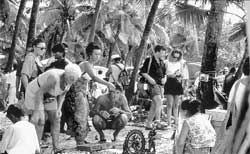Baywatch
 till the Seventies, Goa was one of the hippie capitals of the world, with the disenchanted "flower-children" of the West living out their version of "nirvana" on a few of North Goa's golden-sand beaches. The decade between 1968-1978 was a time when the exotic locales of Goa attracted tourists in droves. Although Goa's first five-star hotel - the Tata-owned Fort Aguada Beach Resort - had just opened within the ramparts of a colonial Portuguese fort, hospitality was still provided primarily by households along the coast.
till the Seventies, Goa was one of the hippie capitals of the world, with the disenchanted "flower-children" of the West living out their version of "nirvana" on a few of North Goa's golden-sand beaches. The decade between 1968-1978 was a time when the exotic locales of Goa attracted tourists in droves. Although Goa's first five-star hotel - the Tata-owned Fort Aguada Beach Resort - had just opened within the ramparts of a colonial Portuguese fort, hospitality was still provided primarily by households along the coast.
All that changed when the Goa government announced a Tourism Master Plan in 1987. The plan proposed freezing a 75-80 km stretch of coastal Goa for an estimated 19 five-star and luxury hotels. The government's intentions outraged a section of Goa's intelligentsia and thus was born the umbrella-organisation, Jagrut Goenkaranchi Fauz ( jgf ) (Konkani for 'Vigilant Goans Army').Faced with severe criticism and following an adverse sub-committee report, the Master Plan was eventually scrapped.
Today, the jgf is an activist campaign group credited with scores of successful protests against tourism mega-projects that are environmentally unsustainable. The driving force behind the jgf is 37-year-old Roland Martins. Initially a student activist, Martins says the purpose behind the formation of jgf was "to create space for the local people to react to tourism mega-projects that were planned in their villages, often without their knowledge." He explains: "A luxury five-star 'ghetto' has a tremendous impact on the neighbouring villages. Fishermen who traditionally dried their fish, anchored their boats and mended nets on the shore were suddenly told that they were 'in the way'. Coconut plantations were either cut down or cordoned off, displacing toddy-tappers."
A remarkable strategy marks Martins work. On one hand he deftly draws the attention of international environmental groups to issues in Goa, while on the other he utilises the humble village gram sabhas as an effective platform to take on big moneyed interests entering this small region. "Since tourism is about international travel, we internationalised the issues with support from environmental and Green groups abroad," says Martins. For instance, in South Goa the German Kempenski group, in collaboration with Leela Hotels, was destroying a peninsular stretch of the beach. They were digging out sand-dunes and uprooting coconut trees to create an artificial lagoon. Local people were asked to sell their property and vacate the area. Martins questioned the German policy of not implementing the same standards in Goa as those applicable in their country. "We contacted the German Green Party, and questioned these double standards," he said. As a fall-out, a Green Party team visited Goa. Their report validated the stand adopted by jgf .
Besides disrupting the lives of the local villagers, the resorts wreaked havoc on the ecology of the region. Hotels sunk tube-wells and sucked dry aquifers for their swimming pools and lawns, even as nearby springs dried up. "Even today, luxury hotels buy trucks of water, stolen from nearby villages, at the throwaway price of less than five paise per litre," says Martins.
Operations of the :rmy' "We cannot fight for the people. Only along with them," says Martins, adding: "If you work with the people you can arrange successful campaigns on the minimum of finance. While tourism views the local people as part of an exotic backdrop, jgf wants their active participation." So, the gram sabhas become political platforms for people to voice their opinions. From 1990, the jgf began a grassroots campaign and organised padyatras through the coastal talukas (sub-districts) in the extreme north and south of the state which were being promoted for luxury tourism.
The jgf virtually ran up to three campaigns in a year. Some of them, like 'Operation Cold Turkey' against drug trafficking, 'Operation Dress Up' against nudism and 'Operation Block aids ' to raise awareness about hiv-aids forced the government to sit up and take notice of the ills afflicting the state. At present, the jgf is preparing "a tourism manifesto for the forthcoming Assembly elections for the public to screen candidates," says Martins.
